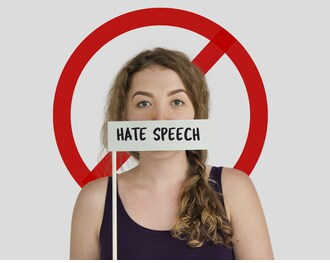Freedom of speech and expression is a fundamental right under Article 19(1)(a) of the Constitution of India. Every citizen has the right t...
Freedom of speech and expression is a fundamental right under Article
19(1)(a) of the Constitution of India. Every citizen has the right to freely
speak, publish, and write anything. This is subject to eight fundamental
restrictions which are also mentioned in Article 19(2). These are as follows:
·
State
Security
·
Friendly
relations with foreign states
·
Public
Order
·
Decency
and Morality
·
Contempt
of Court
·
Defamation
·
Incitement
to an offense
·
Sovereignty
and Integrity of India
Hate speech is different from free speech in many aspects.
Unfortunately, it has become rampant and leaders in Indian society blatantly
peddle hate speech in the name of free speech. This is seen not only in
election campaigns and rallies but also on social media, especially Youtube,
Facebook, Twitter, and Instagram.
Hate speech violates not only decency and morality but also incites
violence against other communities in society. It is against Public Order,
Sovereignty as well as the integrity of our nation. Therefore, it falls as an
exception to free speech under Article 19(2). However, the restrictions
mentioned in Article 19(2) can be applied only in accordance with some laws and
not executive action. Let us see the various laws under which a suit for action
against hate-speech can be brought.
What is Hate-speech?
It is quite hard to define “Hate Speech” but very easy to recognize it. The
267th report of Law Commission of India, hate speech is any speech that incites
hatred towards a group of persons defines in terms of race, ethnicity, gender,
sexual orientation, religious belief, etc.
Hate speech can be expressed through any word written or spoken, signs,
visible representations with the intention of causing fear, alarm, or incitement
to violence.
Unlike Free speech, hate-speech is never grounded in facts or truth.
Half-truths can be molded and presented as facts to support one’s agenda or
negative stereotype. For example, conspiracy theorists often peddle their
theories as hidden truth when in fact they are nothing but speculation. Free
speech on the other hand is grounded in facts, it is transparent in terms of
being speculative, it established previous biases and prejudices of the speaker, and is always grounded in a spirit of inquiry. While Hate speech imposes guilt
on a person or community, free speech never intends to impose guilt but only
encourages further inquiry.
Lastly, hate speech is intended to work as incitement and leads to the targeted group to react with equal hate. Such hate can take many unwanted forms
such as more hate speech, violence, and even mob-lynching.
Laws against Hate-Speech:
As seen above, hate speech leads to various crimes in society. While
general animosity between groups is a common impact, hate-speech can also lead
to grave crimes such as mob-lynching and terrorism.
Remedy in Criminal Law:
Indian Penal Code, 1860
·
Section 153A: Attempt to instigate riots knowingly by giving provocation; promoting
enmity between different groups on grounds of religion, race, place of birth,
residence, language, etc., and doing acts prejudicial to maintenance of
harmony. Punishment can extend to up to 3 years, or fine, or both. It is a
cognizable, non-bailable, non-compoundable offense. F.I.R or complaint to
magistrate can be filed.
·
Sections
295A: Deliberate and malicious acts, intended to outrage religious feelings of
any class by insulting its religion or religious beliefs is punishable by 3
years, or fine, or both. The offense is cognizable, non-bailable, and
non-compoundable. You can register an F.I.R against the culprits.
·
Section
298: Uttering words etc. with deliberate intent to wound the religious feelings
of any person is punishable with up to 1-year imprisonment, or fine, or both.
It is a non-cognizable, bailable, and compoundable offense. A complaint can be
lodged with a magistrate as well as the Police.
·
Section
124A: Sedition is punishable. Sedition is any act (speech, signs, etc.) that
brings or attempts to bring into hatred or contempt or excites or disaffection
towards the Government. Punishable with imprisonment for life and fine, or
imprisonment of three years.
·
Section
505: [statement conducing to public mischief] - This
section penalizes publication or circulation of any statement, rumor, or report
causing public mischief and enmity, ill-will, or hatred between the classes. Punishable
with three or more years, fine or both.
Criminal Procedure Code, 1973
·
Section 95
- State Government can forfeit publications which are violative and punishable
under sections 124A, 153a, 153B, 292,293 or 295A of IPC
·
Section
107: Executive magistrate can pass orders or take action to prevent a person
from committing a breach of the peace, disturbing public tranquillity, or do any
wrongful act that may probably cause a breach of the peace or disturb public tranquillity.
·
Section
144: District Magistrate, SDM, or Executive magistrate who are specially
empowered (or designated) by State Government can issue an order in urgent cases
of nuisance or perceived danger.

















COMMENTS